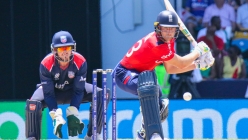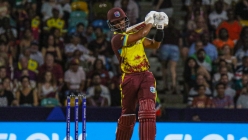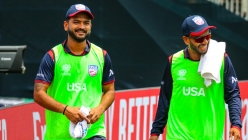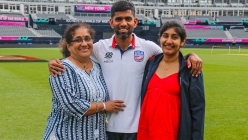Leave them kids alone!
2009 Sep 14 by DreamCricket
On July 23rd, the Board of Directors of Northern California's oldest and largest cricket league, the Northern California Cricket Association (NCCA), unanimously passed a proposal to restrict its players from playing in matches organized by other leagues or associations in the North West Region.
On July 23rd, the Board of Directors of Northern California's oldest and largest cricket league, the Northern California Cricket Association (NCCA), unanimously passed a proposal to restrict its players from playing in matches organized by other leagues or associations in the North West Region.
Simultaneously, restrictions were imposed on NCCA's registered players from voluntarily coaching a non-league player within the region or serving as an umpire for matches organized by other leagues. The restrictions become effective tomorrow i.e. September 15th.
The league is well within its rights to do as it did. Especially since the proposals were properly (and unanimously) approved by the league's board.
It is also hard to argue with the league's reasoning for the restrictions - to promote dedication among its player ranks. Playing for multiple teams is a problem that is in urgent need for resolution at every level of representative cricket (think Dirk Nannes). One cannot fault a league for taking what it deems are appropriate steps in this regard.
However, these restrictions have not been without other repercussions. Firstly, junior cricketers have been forced to choose between the organization that taught them the joy of cricket and the one that they aspire to play for. The boys are simply not ready to do so at this time.
Secondly, the underlying reasons given by NCCA - both the avowed and the unstated - have brought into sharp focus certain fundamental issues regarding voting rights in USA Cricket.
First, some background
"In a large society, inhabiting an extensive country, it is impossible that the whole should assemble to make laws. The first necessary step, then, is to depute power from the many to a few of the most wise and good." John Adams - April 1776
In 2008, USA Cricket Association (USACA) got itself a vastly improved and democratically approved constitution through the efforts of the ICC and a few wise and good men. Perhaps in recognition of the fact that no constitution is perfect, the framers of USA Cricket's constitution have made provisions for endurance through the inclusion of an amendment process - amendments must be ratified by two-thirds of the voting delegates at an annual special meeting.
This constitution was adopted in January of 2008 - the result of which was that leagues, now bestowed with the right to vote, elected the current leadership of USACA.
The new constitution also specifies that a region must have at least three leagues, each of which must have a minimum of eight clubs comprising an active membership roster of at least 15 members who play regularly in an organized cricket league. On the face of it, this is a fairly simple model. But it makes several assumptions that have come into question.
All leagues are created equal! Not!
Back when the constitution was passed, most of USA's cricket community was completely disenchanted with USACA. Even the ratification process was voted on by just 25% of those invited to vote.
So when the constitution granted parity to a league with 50 clubs and a league with 8 clubs, the protests were muffled. But since the 2008 election, lots has changed for USA cricket. With USA cricket revitalized, the demands for proportionate voting rights have grown louder.
There is nothing radical about the concept of proportionate voting. Ensuring that all free persons are proportionately represented is something that even the founding fathers of America had to guarantee, which is why congressional house seats are apportioned by counting the whole number of persons. Not having proportionate voting poses several issues for USACA such as fragmentation and lack of cohesion.
Fragmentation
When new leagues are formed in a region, it is not always because the game is expanding. In some cases, it is because a few clubs have decided to break away from the established league owing to political differences.
By granting the new breakaway league the all-important vote and not taking size of its membership into consideration, USA cricket runs the risk of encouraging further fragmentation of USA's cricketing landscape, which it can ill afford. This also adversely impacts political dynamics in the region and makes constituent leagues less cohesive.
More and more, you hear of leagues wanting to split themselves up because that makes them eligible for more votes.
Which is perhaps why in most countries, you will find just one league or association at the regional level, which is subdivided into divisions or zones according to geography or playing ability. Voting rights are usually vested in clubs that meet certain minimum criteria.
USACA must review the right to franchise and proportionate voting in light of the above.
Membership
Many players play for multiple leagues causing avoidable problems for leagues across USA. Besides the aforementioned problem of player loyalty, which the leagues can address through their own rules for qualification, the overlaps also cause potential duplication of voting rights.
As an example, if two of the 8 teams in a region also take part in another league with exactly 8 teams, then is the region right in having two voting leagues?
In most regions, one will find a Saturday league and Sunday league - usually with overlapping players. Similarly, voting rights can be multiplied as separate leagues are set up for different seasons (summer vs winter league), different formats of the game (number of overs) and different type of ball (soft ball or hard ball).
Of course, in some parts of USA, the better players play in multiple leagues across state lines.
This overlap in membership is something USA Cricket must take into consideration when making the necessary adjustments to the constitution. A member, if he belongs to multiple leagues, must be counted as one of the 15 members for a single club of his choice.
Junior Cricket
This subject is close to my heart because our own DreamCricket Academy is involved in this space. A sporting academy's success depends largely on its ability to create a path for its graduates to play in the senior leagues. Because not all junior cricketers have the same ability or skill, such a transition from a junior cricketer to a senior can take several years. During the transition, the junior cricketer may need to play age-group cricket as well as club-level cricket.
My own view is that youth cricket could use a lot less politics, a period of nurture and a greater degree of understanding among the clubs and leagues. These clubs and leagues may have their own youth programs. In NCCA's case, the league has a well qualified youth program which is subsidized for league members. As we have reported on this website before, several of the players on USA U19 team are from this NCCA program.
But I hope competitive spirit does not come in the way of welcoming and nurturing junior talent wherever they can find such talent. I am confident that there are more elegant solutions to ensure that the league's facilities are not taken for granted by those with dual loyalties.
In an article on this website yesterday, we read about how Raj Dungarpur had CCI rules modified to ensure that Sachin Tendulkar felt welcome at the club when he was still a junior cricketer. CCI rules would not have allowed him access to the dressing room.
Once again, I speak from my vantage point as someone with an interest in an Academy. If two years from now, a neighborhood league starts its own youth program, I hope it will still welcome our kids just as it does now.
At the same time, it would also not be in DreamCricket Academy's best interest to get into politics. Getting into politics is a slippery slope for academies and my own view is that political involvement should be restricted to associations whose membership is over 19 years of age. That's right. Let us leave the politics to the adults.
USACA must close the gap in the constitution that currently allows an academy with 8 teams of 13 year-olds to become a full-member league with the same rights as a senior league.
Likewise, junior cricket programs, which are a result of years of hard work by passionate individuals should be shielded from political decisions.
Call for Magnanimity
Niccolo Machiavelli wrote in The Prince: "We have not seen great things done in our time except by those who have been considered mean; the rest have failed.”
If by imposing the aforementioned restrictions, NCCA's aim is to serve as a catalyst for bringing about positive changes including proportionate voting, then it has achieved its goals. If it really only wanted to deal with fence-sitters who jump from one league to another at the time of inter-league competitions, then it is well within its rights to insist on player loyalty.
But Machiavelli also said that a prince should seem to be merciful, humane and frank. For NCCA, the first thing to do is to take a magnanimous view towards the junior cricketers of California. Let the juniors enjoy the lovely game of cricket wherever they want without strings attached while adults sort out issues related to governance.




